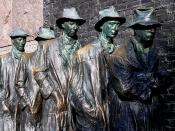The Depression was a financial fall-out that affected the population globally. In Australia the Depression began in 1929 and ended in 1937. High levels of unemployment, poverty, evictions and homelessness spread across Australia. Two main strategies suggested to solve the problems of the Depression was a deflationary policy, such as the one devised by Sir Otto Niemeyer and an inflationary policy, as suggested by Edward Granville Theodore and John Thomas Lang. The Government finally decided to implement a deflationary policy, yet this attempt was not successful in ending the Depression.
As a result of the Depression, there were many social and economic problems including high unemployment, homelessness and poverty. The high levels of unemployment are demonstrated in that 29 per cent of Australians were unemployed in 1932, a dramatic rise of 17.9 per cent since 1929. Due to the levels of unemployment many were unable to afford rent or mortgage fees, resulting in evictions and homelessness.
For example, 24 families were forced to settle in a camp at Lidcombe, due to evictions from their homes. High unemployment rates also meant that many people were living in poverty. Some people were forced to search for food in rubbish bins, because they were unable to afford food. Others would wait outside restaurants in the hope of obtaining food scraps from leftovers thrown in the bins. Clearly the Depression had a devastating affect on Australian society.
During the Depression people resorted to many different ways of coping with the problems arising from their situation. One such way was to send their children to orphanages. Parents unable to provide for their children due to lack of income and money would abandon them. The problem of homelessness was addressed by the building of camps for those who had nowhere to live after having been evicted.


